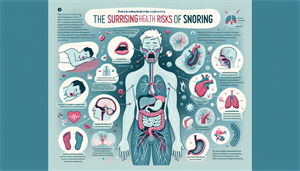
Is Snoring Bad for You? Find Out the Surprising Health Risks
Snoring is a common phenomenon that many people dismiss as a mere annoyance. But have you ever wondered, “is snoring bad for you?” As it turns out, snoring can have significant health implications, including sleep deprivation and relationship strain. In this article, we will explore the surprising health risks associated with snoring, the various types, and their causes, as well as when to seek medical help and possible treatment options.
Key Takeaways
Snoring can lead to sleep deprivation, decreased marital satisfaction and strain on relationships. Various types of snoring are caused by anatomical and lifestyle factors, which should be identified for the best treatment option. Obstructive Sleep Apnea is a serious disorder that requires proper diagnosis and treatment in order to improve health outcomes.
The Impact of Snoring on Health
Snoring is not just a nighttime annoyance; it can also result in sleep deprivation and relationship strain, which are harmful to your health. Snoring bad can affect the sleep quality of their bed partner. It’s more prevalent among men and individuals who are overweight. Breathing patterns that include interrupted breathing, snoring, coughing, or gasping for air may suggest a medical condition like obstructive sleep apnea. Chronic snoring can interfere with sleep patterns, affecting sleep quality for both the snorer and their partner, leading to potential health risks and relationship issues.
Sleep Deprivation
Sleep deprivation resulting from snoring can have a range of negative consequences on one’s health. Snoring can cause disturbances in sleep stages, leading to fragmented sleep and decreased sleep quality. As a result, snorers may experience: Daytime sleepiness, impaired cognitive function, mood disturbances, and increased risk of accidents. Research has shown that sleep deprivation from snoring can interfere with the functioning of certain brain areas, resulting in decreased cognitive performance in older women. Finding ways to stop snoring can improve cognitive function and overall well-being.
Relationship Strain
The psychological effects of snoring on a partner can include: resentment, guilt, reduced emotional and physical intimacy, sleep deprivation, irritability, anxiety, and depression. Snoring can disturb the sleep quality of partners, leading to frequent awakenings during the night and increasing feelings of stress, depression, and fatigue during the day. Several studies have examined the impact of snoring on marital satisfaction, indicating that snoring, particularly in the context of sleep apnea, can lead to decreased marital satisfaction and intimate behaviors. Addressing snoring issues with the help of a sleep medicine specialist can improve relationship dynamics and overall well-being.
Types of Snoring and Their Causes
Snoring can be attributed to both anatomical and lifestyle-related causes. Anatomical factors include blocked airways, the structure of the mouth and sinuses, and age, while lifestyle-related factors encompass alcohol consumption, allergies, a cold, and weight. Obesity, in particular, has been linked to the development of obstructive sleep apnea, which can result in snoring. Identifying the kind of snoring and its cause is key to determining the appropriate solution to minimize or stop snoring, enhance sleep quality and mitigate related health risks.
Anatomy-related Snoring
Anatomy-related snoring occurs due to structural irregularities in the airway. Conditions that obstruct the airway, such as enlarged tonsils and adenoids, can generate obstruction and turbulence in the airflow during sleep, resulting in snoring and disturbed breathing patterns, including sleep apnea. The positioning of the tongue also has a considerable impact on snoring. When the tongue is situated incorrectly, such as dropping to the back of the throat, it can create...


